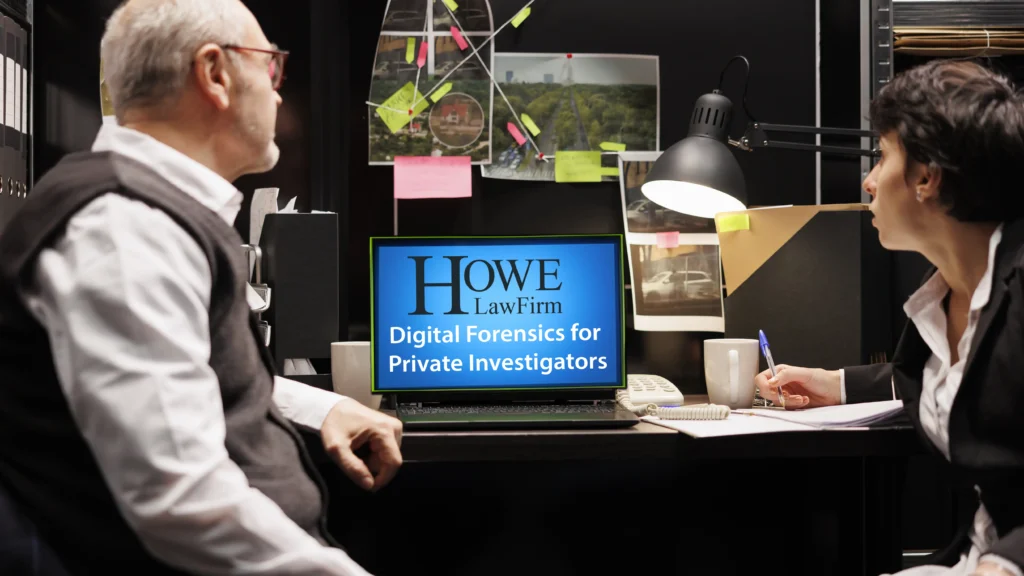Let our digital forensics enhance your private investigator services with our remote evidence collection and internet router analysis.

Expand your Investigations with Electronic Evidence.
We will gather evidence to help you solve your cases quickly and decisively. Whether you are investigating infidelity, cyberharassment, business espionage, or other disputes, commonly sought electronic evidence may include:
- Text Messages
- Social Media
- Browsing History
- GPS Data
- Emails
- Documents
- Photos
- Videos
- Call Logs
- App Data
- and More!
Text messages, photos, emails, and other items frequently have metadata intact. Metadata provides additional context to create an informative timeline of events and communications and illuminate hidden motivations or activities.
Our evidence reports make your review easy. First, we will cull the data down to the most likely responsive items – such as applying a date filter or limiting text messages to and from certain recipients. Then, using powerful Excel features, you can quickly sort, filter, and organize the electronic data to review large swaths of details.
Put a Digital Expert on Your Side.
We secure evidence from electronic devices and online accounts. Common sources include:
- Smartphones (iPhone & Android)
- iPads and Other Tablets
- Mac and Windows Computers
- Internet Router
- Email Accounts
- Social Media Accounts
Our forensic examiners are lawyers who understand how to maintain a chain of custody and preserve your evidence. We use the best-of-breed tools available to acquire the digital footprints for your case securely.
How can Digital Forensics Help Private Investigators?
Our remote collections are scalable. We can efficiently and conveniently collect electronic evidence from your clients’ cell phones, computers, email accounts, and social media. We have Black Boxes ready to ship wherever they are needed.
- Convenience. Keep your phones and computers on-site.
Fully Defensible Collections. Our equipment and forensic services are fully defensible, and we can supply declarations or expert witness testimony as required.
- Flat Fee Services. We charge only flat fees for each device or account acquisition. There is no charge for phone calls, emails, or data storage.
- Read more about our remote collection process here.
Our Excel Evidence reports are easy to navigate and designed to help you find relevant data quickly.
How Can Our Counter Surveillance Services Enhance Yours?
Our Private Investigator clients often pair their bug sweeps with our electronic analysis.
- Router Analysis. The most common means for a suspect to transfer surveillance information from hidden cameras and microphones is through the home’s internet router. We remotely analyze internet router configurations, log files, and traffic for signs of surveillance. You can read more here.
- Spyware, Malware, Spying Detection on Phones, Tablets, and Computers. Using the best mobile forensic software available, we evaluate cell phones, tablets, and computers for security risks, spyware, malware, rootkits, and trojan horses.
- Remote Collection & Analysis. We ship a “Black Box” (our Remote Collection Unit) directly to you or your client. Our Black Boxes are loaded with the best-of-breed forensic software. We rely on leading cell phone forensic software that is recognized domestically and internationally, and we will use the solution that is appropriate for your device. When ready, we will walk you through connecting your phone and will secure a forensic image using the forensic software that is appropriate for your case.
Need Help with TSCM Bug Sweeps?
We provide comprehensive TSCM bug sweep services for homes, offices, and cars nationwide. Our bug sweeps are thorough and extensive, searching for hidden cameras, microphones, GPS trackers, and other surveillance devices using professional-grade equipment. We conduct sweeps of all accessible interior areas and utilize a drone to capture video recordings outside of the home or office. This helps us identify transmitters and receivers. Additionally, we evaluate smart TVs as part of our comprehensive bug sweep.
Our flat fees are all-inclusive – we do not charge extra for travel expenses, data storage, phone calls or emails, or the final written report.
Infidelity Investigations
Uncovering hidden communications or other suspicious behavior is vital in cases of suspected infidelity, and digital devices often hold the answers.
Online Accounts: What dating apps or social media platforms are on the phone? Tinder? Bumble? Grindr? Facebook? Others?
Smartphones: By analyzing text messages, call logs, contacts, and GPS data, investigators can reveal secret conversations or locations that indicate infidelity.
Computers: A thorough review of browser history, emails, and online communication tools can uncover inappropriate online behavior, hidden social media profiles, or even unknown financial institutions.
Family Law Divorce & Custody Disputes
Consider the evidence that can impact divorce settlements and custody battles.
Smartphones: Text messages, call logs, and GPS data can reveal a parent’s interactions with the children or between each other.
Computers: Emails, internet history, and other digital documents can expose locations of hidden assets, forged documents, or unauthorized financial transfers.
Online Accounts: Social media profiles, email accounts, and banking transactions can provide insights into unreported assets.
Corporate Investigations into Employee Misconduct
When looking into potential intellectual property theft or employee misconduct, private investigators may need to review various evidence sources.
Smartphones: Text messages, emails, and file-sharing apps can reveal unauthorized sharing of sensitive company information.
Computers: Examining digital documents, emails, and software installations can expose unauthorized downloads or access to confidential files.
Internet Routers: Router logs can identify unusual network traffic that may indicate data exfiltration attempts or remote access.
Online Accounts: Investigating cloud storage or work-related emails can expose the misuse of company resources or evidence of insider threats
Insurance and Fraud Investigations
Smartphones: Location data, emails, and financial apps can expose inconsistencies in insurance claims or fabricated accidents. Text messages could uncover fraudulent schemes.
Computers: Digital documents and metadata can reveal altered or forged insurance claims and fake medical reports.
Internet Routers: Router logs track unusual network activity and can indicate unauthorized access.
Online Accounts: Investigating emails and online banking can expose fraudulent transactions or fake profiles.
